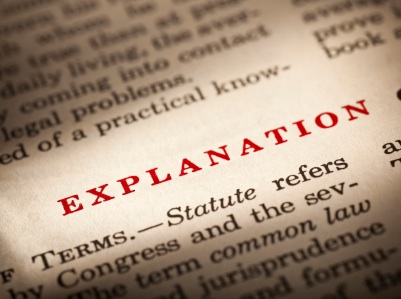Call us for a consultation to better understand legal terms specific to your case.
(904) 396-9669
LEGAL GLOSSARY
Arbitration: Arbitration is a legal proceeding in which a dispute is resolved by an impartial adjudicator whose decision the parties to the dispute have agreed, or legislation has decreed, will be final and binding.
Breach of Contract: Violation of any of the agreed-upon terms and conditions of a binding contract. Sometimes the process for dealing with a breach of contract is written in the original contract.
C Corporation: For tax-paying purposes, a C Corporation is recognized as a separate taxpaying entity. A corporation conducts business, realizes net income or loss, pays taxes and distributes profits to shareholders.
Circuit Court: Court for actions to facilitate disputes in the amount of $15,000 or above.
County Court: Court for actions to facilitate disputes in the amount of $5,000-$15,000.
Deed In Lieu of Foreclosure: A deed-in-lieu of foreclosure is a cancellation of your mortgage if you voluntarily transfer title of your property to your mortgage company. A deed-in-lieu of foreclosure may not be an option if there are other liens on the property, such as second mortgages, judgments from creditors, or tax liens.
Defendant: In criminal cases, the defendant is the person accused of the crime. In civil matters, the defendant is the person or organization that is being sued.
Eviction: In general, the removal of a tenant from possession of premises in which he or she resides or has a property interest done by a landlord either by reentry upon the premises or through a court action. Each eviction case is unique, so be sure to obtain legal advice. Florida Landlord / Tenant Law is covered by Chapter 83, Part II of the Florida statutes.
Felony: A felony is a serious crime. Florida has five degrees for felony offenses: Felony in the third degree, felony in the second degree, felony in the first degree, life felony and capital felony.
Foreclosure: A specific legal process in which a lender attempts to recover the balance of a loan from a borrower who has stopped making payments to the lender by forcing the sale of the asset used as the collateral for the loan. To learn about foreclosure proceedings, you can review Florida laws, particularly Chapter 702, Florida Statutes and Section 45.031, Florida Statutes.
Garnishment: A judgment creditor can obtain a continuing writ of garnishment which orders your employer to deduct money from your paycheck until you have paid off a judgment.
Lien: A charge on specific property that is designed to secure payment of a debt or performance of an obligation. A debtor may still be responsible for a lien after a discharge.
Limited Liability Company: A Limited Liability Company (LLC) is a business structure allowed by state statute. Limited Liability Companies (LLC) are covered under Chapter 608 of the Florida Statutes. You should get legal advice if you are interested in starting a Limited Liability Company. Depending on elections made by the LLC and the number of members, the IRS will treat an LLC as either a corporation, partnership, or as part of the LLC’s owner’s tax return.
Living Will / Medical Directive: A written or oral statement about how you want medical decisions made should you not be able to make them yourself and/or it can express your wish to make an anatomical donation after death.
Mediation: A process for resolving disputes that allows parties, with the help of a mediator, to come to an agreement on contended issues. A Florida Supreme Court certified mediator conducts the mediation according to rules and statutes.
Misdemeanor: An criminal offense punishable by one year of imprisonment or less.
Motion to Dismiss: A “motion to dismiss” asks the court to decide that a claim, even if true as stated, is not one for which the law offers a legal remedy.
Plaintiff or Claimant: The person who initiates a lawsuit by filing a complaint.
Power of Attorney: A power of attorney (POA) or letter of attorney is a written authorization to represent or act on another’s behalf in private affairs, business, or some other legal matter.
Purchase and Sale Agreement: A Purchase and Sale (P&S) agreement is the document received after mutual acceptance on an offer, which states the final sale price and all terms of the purchase. The specific items in this contract vary by state.
Record Expungement: Expungement is a procedure that removes a criminal record pertaining to a particular court case. Certain criteria must be met in order to be eligible.
Record Sealing: Sealing is the process of removing from public view the records pertaining to a particular court case. Certain criteria must be met in order to be eligible to have a record sealed or expunged.
Right of Redemption: The right of a debtor whose real property has been foreclosed upon and sold to reclaim that property, if they are able to come up with the money to repay the amount of the debt.
S Corporation: S corporations are corporations that elect to pass corporate income, losses, deductions and credit through to their shareholders for federal tax purposes. Shareholders of S corporations report the flow-through of income and losses on their personal tax returns and are assessed tax at their individual income tax rates.
Short Sale: A home that is listed for sale at a price lower than the amount owed on the mortgage. A short sale must be approved by the lender, and is an option to avoid penalties associated with going into foreclosure.
Small Claims Court: Court for actions to facilitate disputes in amounts less than $5,000.
Statute of Limitations: The time within which a lawsuit must be filed or a criminal prosecution begun. The deadline can vary, depending on the type of civil case or the crime charged.
Subpoena: A command, issued under a court’s authority, to a witness to appear and give testimony.
Trust: A trust is an arrangement under which a trustee holds legal title to property for a beneficiary. You can be the trustee of your own living trust, keeping full control over all property held in trust. You can create a “living trust” while you are alive, rather than one created at your death under the terms of your will.
Violation of Probation: An offense that occurs when you break the terms or conditions of your probation. Usually, consequences associated with a VOP depend on the nature and seriousness of the violation, whether you have any prior violations, and if there are other circumstances that may lessen (or worsen) the severity of the situation.
Will and Testament: A will or testament is a legal declaration by which a person, the testator, names one or more persons to manage his/her estate, and provides for the transfer of his property at death.
Writ: A written court order directing a person to take, or refrain from taking, a certain act.
The information provided on this website is for general information purposes only, and is not legal advice. We invite you to contact us to schedule a consultation to discuss legal terms specific to your case in Duval, St Johns, Nassau, Baker or Clay County in Florida.


